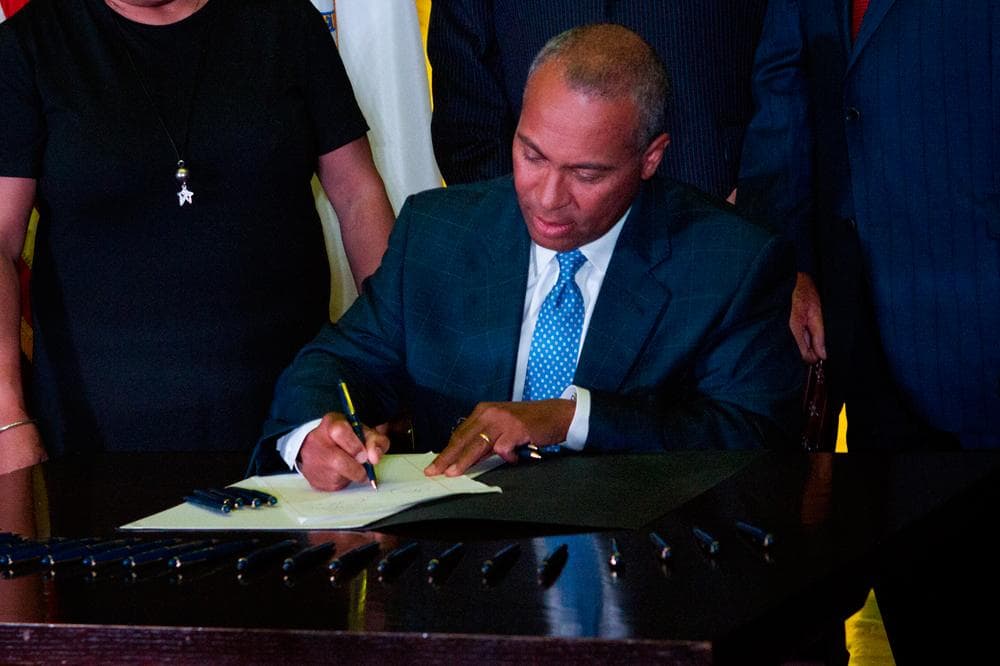Advertisement
'Next Big Step:' Mass. Health Cost Control Bill Signed Into Law

Today, amid cheers and applause echoing against the marble walls and floor of the Nurses Hall in the Massachusetts State House, Gov. Deval Patrick signed into law a groundbreaking bill aimed at controlling health costs. "Today, we take our next big step forward," he proclaimed.
But I write this just for the historical record. The signing was so expected that it isn't really news. So I exploited my Nurses Hall visit to pose a forward-looking question to some of the state health care players assembled for the signing. To wit:
[module align="right" width="half" type="pull-quote"]'This is an incredibly significant and important step but it's going to be a journey.'[/module]
Two or five or ten years from now, what do you think people will be saying about this health cost bill? Their replies:
Len Fishman of Hebrew SeniorLife: "Five years from now people are going to see this as a giant step forward — though not the last one. And I think we'll realize this is every bit as important as the coverage legislation, because if you don't get costs under control, you can't afford universal coverage. (I asked: Any criticism?) I think it'll be the same criticism as now: Some saying it's too little, some saying it's too much. But the emphasis will be on finally tackling the other big issue in health care in this country. I think people will be proud that Massachusetts took the lead on both these issues."
Sarah Iselin of the Blue Cross Blue Shield of Massachusetts Foundation:
I think looking out two years from now, people are going to say, 'We were leading again.' This is a critical but in many ways more challenging problem to solve." It took decades of work to reach a solution to the coverage problem, she noted, and "this is an incredibly significant and important step but it's going to be a journey." The lawmakers wrestled with "the role of the market and how far it would go on its own, and the role of government," she said. "We've set really ambitious goals;" now the future will show: "Are the enforcement mechanisms strong enough?"
[module align="left" width="half" type="pull-quote"]'The state wasn't ready for the tougher regulatory aspects, but it would have been a shame to do nothing.'[/module]
Prof. Stuart Altman: "I think it was an initial, interim step. Ultimately...Either it will turn out that we didn't hit the goals, or hitting the goals was really tough. Some groups could feel the losers. You can't control health care costs without there being some parts of the industry who feel like they'd be better off without it." As national experience has shown, "Ultimately, what you find is the losers scream and the political system gives in. We have to decide, as a state and as a society, the relative worth of controlling spending. But do I feel this is important legislation? Yes. It's exactly where we should be. The state wasn't ready for the tougher regulatory aspects, but it would have been a shame to do nothing."
Dr. Richard V. Aghababian of the Massachusetts Medical Society: "I think they'll be saying that it was a very innovative, forward-thinking law which addressed the issues of quality and cost-effective care for all patients. I'm sure we'll find some things we could have done differently but for pioneers, that's often the enviable — or not quite so enviable — position."
Dolores Mitchell of the Group Insurance Commission: "It was groundbreaking. It set the stage for what a lot of us in the health care business needed to do and went on to do for for the next 10 years."
John Auerbach of the state Department of Public Health: "For the Public Health and Prevention Trust, I think it will demonstrate that by supporting population health, you can decrease the cost of clinical health care."
Dr. Paul Hattis of the Greater Boston Interfaith Organization: "I think they're going to say it was an important first stake in the ground. The cost issue has been plaguing us for 45 to 50 years in this country, so the solution to it — like a chronic disease — is going to take a long time, but you've got to start somewhere."
Josh Archambault of the Pioneer Institute: "It hasn't controlled health care costs and state bureaucrats are slowing down the whole industry and how it innovates." (I asked: And patients?) "I expect we'll see something similar to the HMO backlash by some."
Brian Rosman of Health Care For All: "Either that it was the start of a true transformation of Massachusetts health care that became the model for the rest of the nation — or that it was a great attempt but in the end did not make a major change.
And the difference will be in the implementation. How well do the state officials, health care industry and consumer advocates work to make the promise of the bill a reality? The tools are all there, but it's how they're used." (I noted that the landmark 2006 law left open a similar question, and people are generally happy with the aftermath.) "Will that happen again? We shall see."
Readers? Please add your own predictions in the comments below. And you can listen to a full report from WBUR's Martha Bebinger here.
This program aired on August 6, 2012. The audio for this program is not available.
